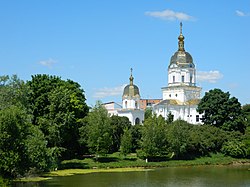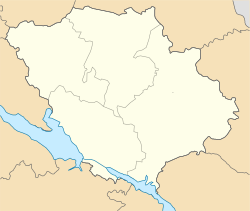Dykanka (Ukrainian: Диканька) is a rural settlement in Poltava Raion of Poltava Oblast in central Ukraine. It hosts the administration of Dykanka settlement hromada, one of the hromadas of Ukraine.[3] Population: 7,427 (2022 estimate)[4]
Dykanka
Диканька | |
|---|---|
 Landscape with Holy Trinity Church | |
Location of Dykanka in Poltava Oblast Location of Dykanka in Ukraine | |
| Coordinates: 49°49′14″N 34°31′47″E / 49.82056°N 34.52972°E | |
| Country | |
| Oblast | Poltava Oblast |
| Raion | Poltava Raion |
| Hromada | Dykanka settlement hromada |
| Founded | 1658 |
| Area | |
• Total | 11.74 km2 (4.53 sq mi) |
| Elevation | 72 m (236 ft) |
| Population (2022) | |
• Total | 7,427 |
| Time zone | UTC+2 (EET) |
| • Summer (DST) | UTC+3 (EEST) |
| Postal code | 38502[1] |
| Area code | 5351 |
| Licence plate [2] | BI |
The settlement is located 26 km (16 mi) away from Poltava-Kyivska railway station.
History
editAncient history
editDykanka was first mentioned in 1658 as a small village, though the area was populated for centuries before. Within the area of modern Dykanka, traces exist of Scythian settlement at various times. Also found were the remains of a settlement that had at one point been razed[citation needed] and the remains of two settlements from the 7th–6th centuries BC.
Medieval history
editIn 1430, the Dykanka area came under the ownership of Tatar Murza Leksada Mansurksanovych, the future Prince Alexander Glinski, and, according to Leo Padalka and other pre-revolutionary (before 1917) historians, Dykanka was among his ″settlements″.
Modern history
editDykanka has held the status of urban-type settlement since 1957.
Until 18 July 2020, Dykanka was the administrative center of Dykanka Raion. The raion was abolished in July 2020 as part of the administrative reform of Ukraine, which reduced the number of raions of Poltava Oblast to four. The area of Dykanka Raion was merged into Poltava Raion.[5][6] On 26 January 2024, a new law entered into force which abolished the urban-type settlement status, and Dykanka became a rural settlement.[7]
Culture
editDykanka is the location of the short story collection Evenings on a Farm Near Dikanka by Nikolai Gogol.[8] The tale of St John's Eve, concerning the family of the Church Sexton, inspired Mussorgsky's tone poem Night on the Bare Mountain.
Gallery
edit-
The facade of the palace of the estate Kochubeys. The architect Giacomo Quarenghi. Picture the end of 19th century
-
Triumphal Arch. The architect - the academician of architecture Luigi Rusca, 1820
-
Church of the Holy Trinity, 1780, late Baroque
-
Church of St. Nicholas. Architect N. A. Lvov, 1797
-
The bell tower of St. Nicholas Church. Architect Luigi Rusca, 1810–1827. Postcard late 19th century
-
Lilac Grove. The former estate of Prince Kochubey. Laid down in the early 19th century
-
Picture gallery of Marie Bashkirtseff
References
edit- ^ Ukrainian Zip Codes
- ^ Как расшифровываются новые номера
- ^ "Диканьская громада" (in Russian). Портал об'єднаних громад України.
- ^ Чисельність наявного населення України на 1 січня 2022 [Number of Present Population of Ukraine, as of January 1, 2022] (PDF) (in Ukrainian and English). Kyiv: State Statistics Service of Ukraine. Archived (PDF) from the original on 4 July 2022.
- ^ "Про утворення та ліквідацію районів. Постанова Верховної Ради України № 807-ІХ". Голос України (in Ukrainian). 2020-07-18. Retrieved 2020-10-03.
- ^ "Нові райони: карти + склад" (in Ukrainian). Міністерство розвитку громад та територій України.
- ^ "Что изменится в Украине с 1 января". glavnoe.in.ua (in Russian). 1 January 2024.
- ^ "The Ukrainian Mystery Of Nikolai Gogol". ValueWalk. January 6, 2017. Retrieved January 6, 2017.
External links
edit- "Dikanka" (news of Dikanka, events, weather, all in English and Russian language)



